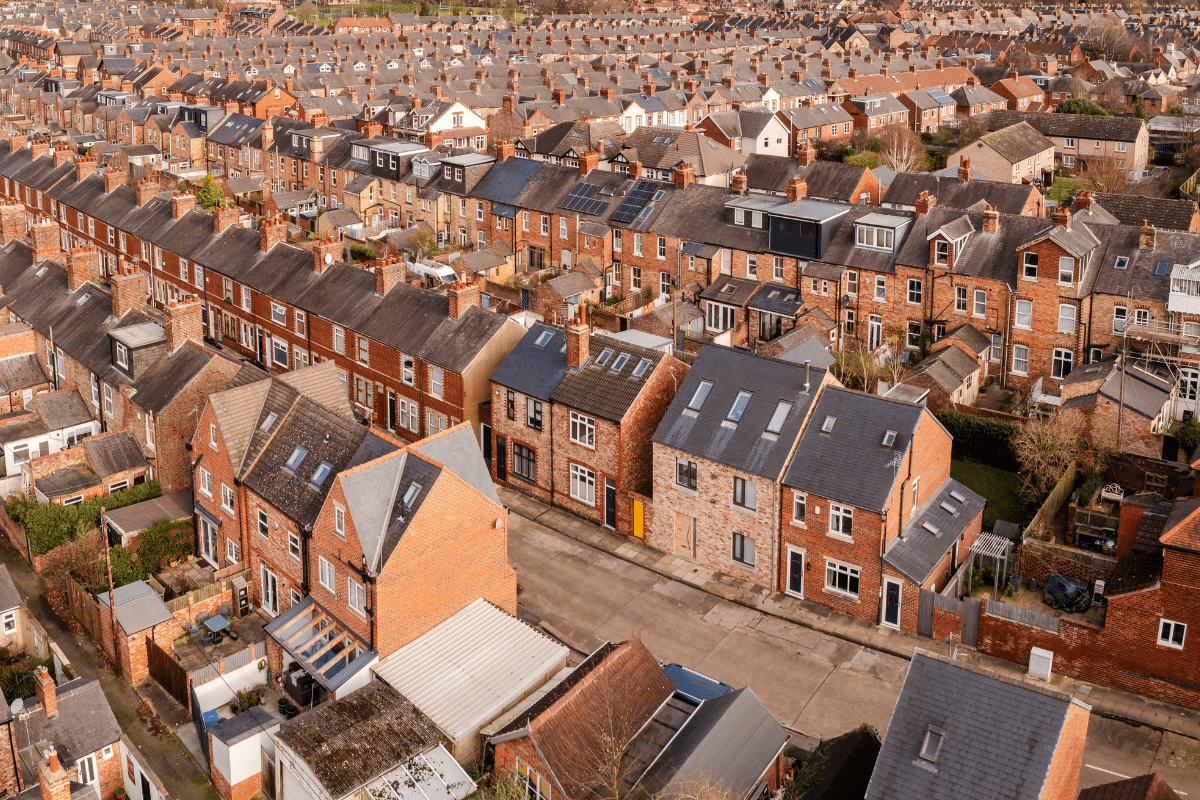How Much Is My House Worth? A Guide to Valuing Property
If you’re selling your house, or even thinking about selling your house, then you’ll want to know how much it is worth first. Here’s a quick guide to help you find out the true value of your home and exactly what your house is really worth.
Article updated: August 2025

-
by Robert Jones, Founder of Property Investments UK
With two decades in UK property, Rob has been investing in buy-to-let since 2005, and uses property data to develop tools for property market analysis.
What is Market Value?
First, when asking how much is my house worth, let's define some of the property terminology that will help us get to the value of your home.
The first step is agreeing the market value of your property, this can help determine it's value. This is identified by looking at the prices of similar properties on the open market.
Market value is not necessarily what it sells for and may not even be the price it gets listed for sale at, which is known as 'asking price', as some sellers will prefer to list for sale at a high price hoping to get lucky and others may list for a low price if they are willing to sell below market value for a quick sale.
The market value, however, gets you close to its potential value.
What Determines the Value of your House?
Its size: That buyers will pay more for a larger house than a smaller one is common sense. But square footage alone is not a reliable guide to the value of your house. In the UK property owners often define the value of their home by the number of bedrooms (note: this is different than other areas of Europe which focus on the total square foot of the property). For example, a three-bedroomed house may be worth more than a two bedroomed house the same size.
Its location: Every City, Town, postcode and street will have different values for the same types of properties. Even close by locations like properties for sale in Bury or in Rochdale, will have different prices, and it ultimately depends on how active an area is and how many homeowners (and tenants) push to live there.
Local amenities: Buyers are generally prepared to pay more for houses that have good local amenities, including shops, public transport links and of course schools.
Its condition: The value of your house may be higher if it is in good condition. It will likely be lower if it is in poor condition, both due to the repair costs involved and also because there are fewer buyers willing or who can afford to take on a project. The kerb appeal or tidiness of your house will not necessarily add to the value of your house, although it may help to attract more viewings and so more offers. This is why property investment strategies like buy refurbish and refinance can work, as investors can purchase run-down properties at a lower than market price and add value with refurbishments.
Tenanted or vacant: Tenancy status also affects value. A tenanted property will typically be valued differently than a vacant home, so consider this carefully before accepting a let agreed application if you're planning to sell soon
The asking price of similar houses: Or what are known as comparable properties. You can find asking prices of similar houses in the area by searching on Rightmove or Zoopla. But remember that asking prices are not the same as market value or actual selling prices.
The actual selling price of similar houses:Sold property prices is an even better comparison than on the market properties. You can also get this data plus information on average selling prices plus annual rises/falls over the last year for every council area (England & Wales) from HM Land Registry.
But there is a catch here. What a buyer was willing to pay a year ago, or even a month ago, does not mean buyers will be willing to pay the same now, especially if you are in the middle of a property cycle downturn in the 18-year cycle.
The price of similar houses that have not sold can be a factor too. If those similar houses remain unsold it could be because they are overpriced and this could put buyers off paying 'market value' for other properties in the area.
Whether a hot or cold property market: A hot market, or seller’s market, is one where there is lots of demand to buy but not enough properties available for sale by comparison, so it is easy for sellers to sell. A cold market, or buyer’s market, is the reverse. There may be many properties for sale but few (or no) willing and able buyers, making it hard to sell.

How Not to Value your House
Here are a number of methods which are NOT a reliable way to value your house:
- What you think your house is worth.
- What you bought your house for, plus an allowance for price rises since.
- How much you have spent on your house, such as any extensions and improvements that have been done.
- The rebuilding cost of your house, eg. an insurance valuation.
- What you need to sell your house for, eg. to buy another one or pay off your mortgage.
- What an estate agent decides your house is worth... more about this coming up.
- What online house price calculators say your house is worth... more about this coming up.
These may all sound a 'fair' assessment of the potential value of your home but don't actually impact a buyer on its value. Take for example a house purchased for £200k and £50k spent on a refurbishment. This property could now be worth much more than £250k. But if the market has shifted down by 20% in the time since you purchased, it could be worth way less.
The Truth about Estate Agents’ Valuations
You can find out what your house is worth by asking an estate agent. If you do this however you need to know that an estate agent’s suggested asking price may not always be what your house is worth!
Good estate agents are experts in their local property markets. They will have a good knowledge of what other houses are for sale locally, what is selling at what price – and what is not selling. A good estate agent will know what is the true value of your house.
Estate agents, however, are in a competitive situation with other estate agents to gain instructions, and this can put them in a challenging position. If they suggest a lower asking price they are likely to lose instructions to estate agents who suggest a high asking price. A high asking price may not be to your advantage, however, as an overvalued house may fail to sell. In some cases, a lower asking price may help to attract more interest from buyers, create more competition and so achieve the highest actual selling price.
When selling your house it is a good idea to ask several estate agents for a valuation and to suggest an asking price and then compare them all.
Ask each estate agent how they arrived at their valuation and suggested asking price. Tell the estate agents:
That you are interested in establishing the highest eventual selling price, not necessarily the highest asking price.
The Problem with Online House Price Calculators
Online house price calculators, sometimes known as automated valuations tools, are online systems that will tell you what they believe your house is worth. Online house price calculators are popular because all you need to do is tap in your address and postcode and they offer an instant, free valuation. However, there are possible problems with automated valuation tools.
When valuing properties, online house price calculators use an algorithm to give you a potential valuation. The algorithm is usually kept secret, but they utilise data including past sale prices, current asking prices, sales trends and average house price rises/falls in the local area.
The problem with automated valuation tools is that they cannot take into account of every possible factor which affects value. They cannot account for the sometimes irrational way in which real human buyers act. As a result, they can sometimes produce valuations which are much too high or much too low.
Many estate agents have a free online valuation tool on their website, so it is worth looking at your local agents, however it won't take in to account all of the variables for your home.
Many you have a larger garden, a new driveway that could add value, three larger bedrooms when your nearest competitor properties only have a small third box bedroom.
All of these can add value and can easily be missed with an online property valuation calculator.
So, How Much is my House Really Worth?
Getting a true valuation for your house is simple in theory but it can be a complicated process in practice! The best way to value your house is to combine a variety of methods:
Step One. Disregard what you think your house is worth!
Step Two. Consider online house price calculators and automated valuation tools as a guide, and a guide only. Use this as a starting point.
Step Three. Ask several estate agents for their estimate of the correct market value of your house and for an appropriate asking price.
It is a good idea to ask at least three estate agents, including traditional high street ones, and compare them. Be aware that because of the way the competitive estate agency market works there is a tendency for estate agents’ valuations to be optimistic.
Step Four. Do your own research to find comparables. Look for similar properties that are for sale, which haven’t sold, and which have sold recently. Use Rightmove, Zoopla and HM Land Registry as a guide.
Consider whether the market in your area is hot, cold or somewhere in between. Be realistic about the current local property market and not swayed by the general national media.
Step Five. Combine the values and consider what the mean or median average is. Be thoughtful, and if you are selling a tenanted property portfolio, consider that this will require a specialist buyer and can affect your prices more than selling one traditional Edwardian house.
In summary, it’s very true to say that valuing your house is never an exact science. There’s really no such thing as an exact value for what your house is really worth, but many different valuations.
Buyers, sellers, estate agents, home surveyors and others will all take a slightly different view, with the true value of your house being somewhere in the middle. At the end of the day, your house is worth what a willing and able buyer is willing and able to pay for it AND what you are willing to sell it for.
